NIT6130 Research Ethics: Nuclear Testing, Safety, Integrity Issues
VerifiedAdded on 2023/06/15
|10
|2266
|187
Essay
AI Summary
This essay provides an analytical overview of the ethical dilemmas associated with nuclear weapons use and testing, drawing upon research in nuclear ethics, moral frameworks, and disarmament. It examines the pros and cons of nuclear deterrence, highlighting the increased threat perception and humanitarian impacts. The study delves into ethical issues, integrity, safety concerns, and risks, responding with philosophical approaches like utilitarianism and deontology to assess nuclear deterrence and unilateral disarmament. It concludes by advocating for ethical decision-making in addressing nuclear threats, emphasizing the importance of global cooperation and moral considerations.
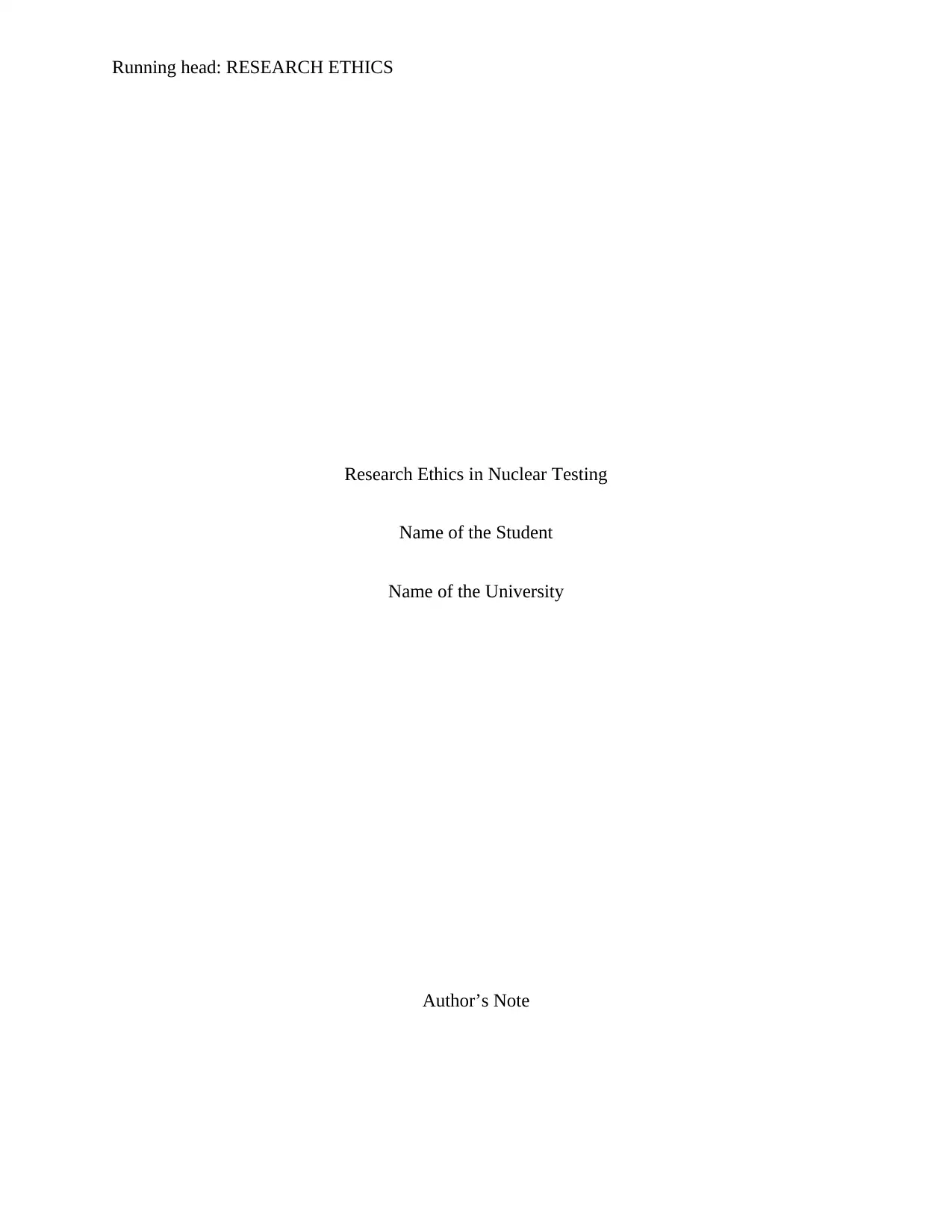
Running head: RESEARCH ETHICS
Research Ethics in Nuclear Testing
Name of the Student
Name of the University
Author’s Note
Research Ethics in Nuclear Testing
Name of the Student
Name of the University
Author’s Note
Paraphrase This Document
Need a fresh take? Get an instant paraphrase of this document with our AI Paraphraser
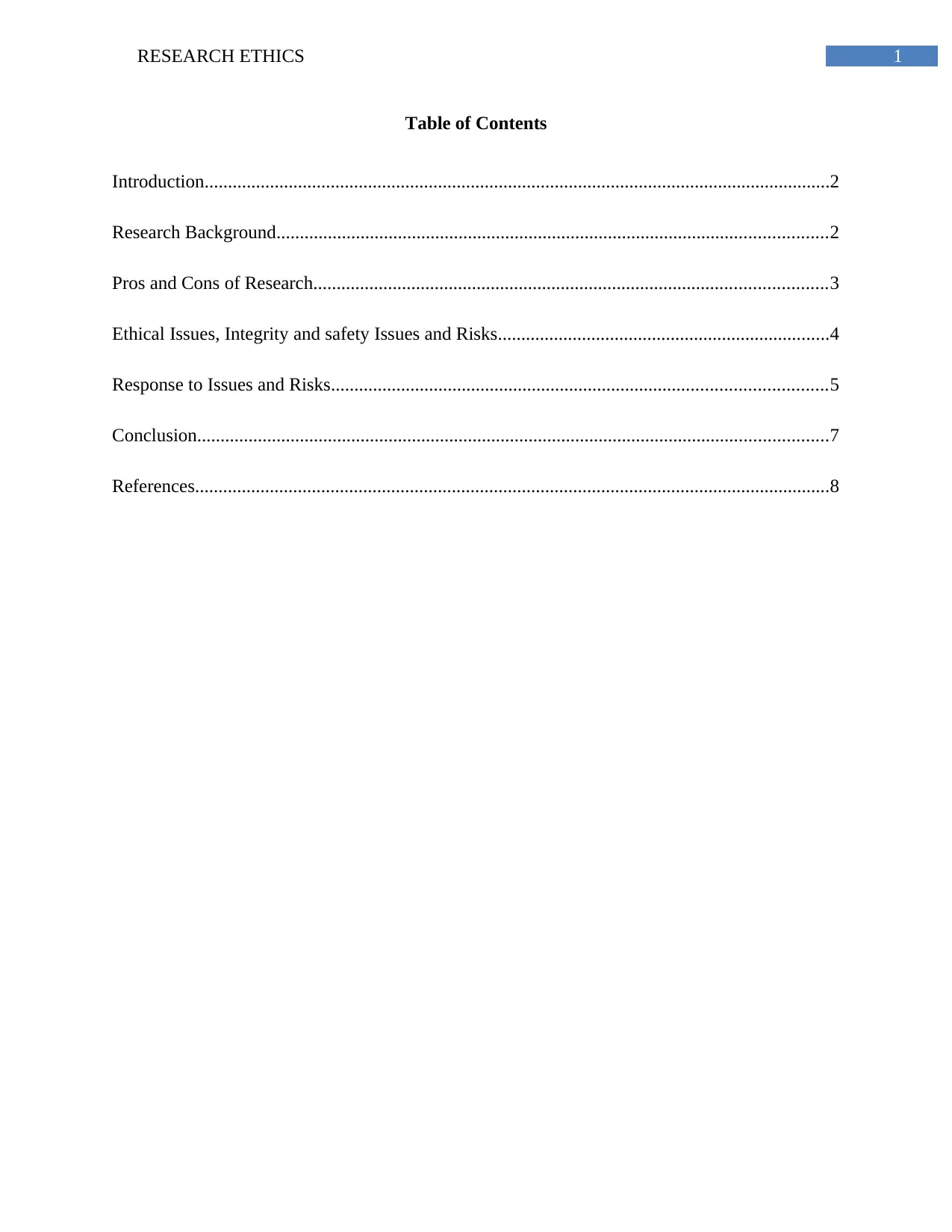
1RESEARCH ETHICS
Table of Contents
Introduction......................................................................................................................................2
Research Background......................................................................................................................2
Pros and Cons of Research..............................................................................................................3
Ethical Issues, Integrity and safety Issues and Risks.......................................................................4
Response to Issues and Risks..........................................................................................................5
Conclusion.......................................................................................................................................7
References........................................................................................................................................8
Table of Contents
Introduction......................................................................................................................................2
Research Background......................................................................................................................2
Pros and Cons of Research..............................................................................................................3
Ethical Issues, Integrity and safety Issues and Risks.......................................................................4
Response to Issues and Risks..........................................................................................................5
Conclusion.......................................................................................................................................7
References........................................................................................................................................8
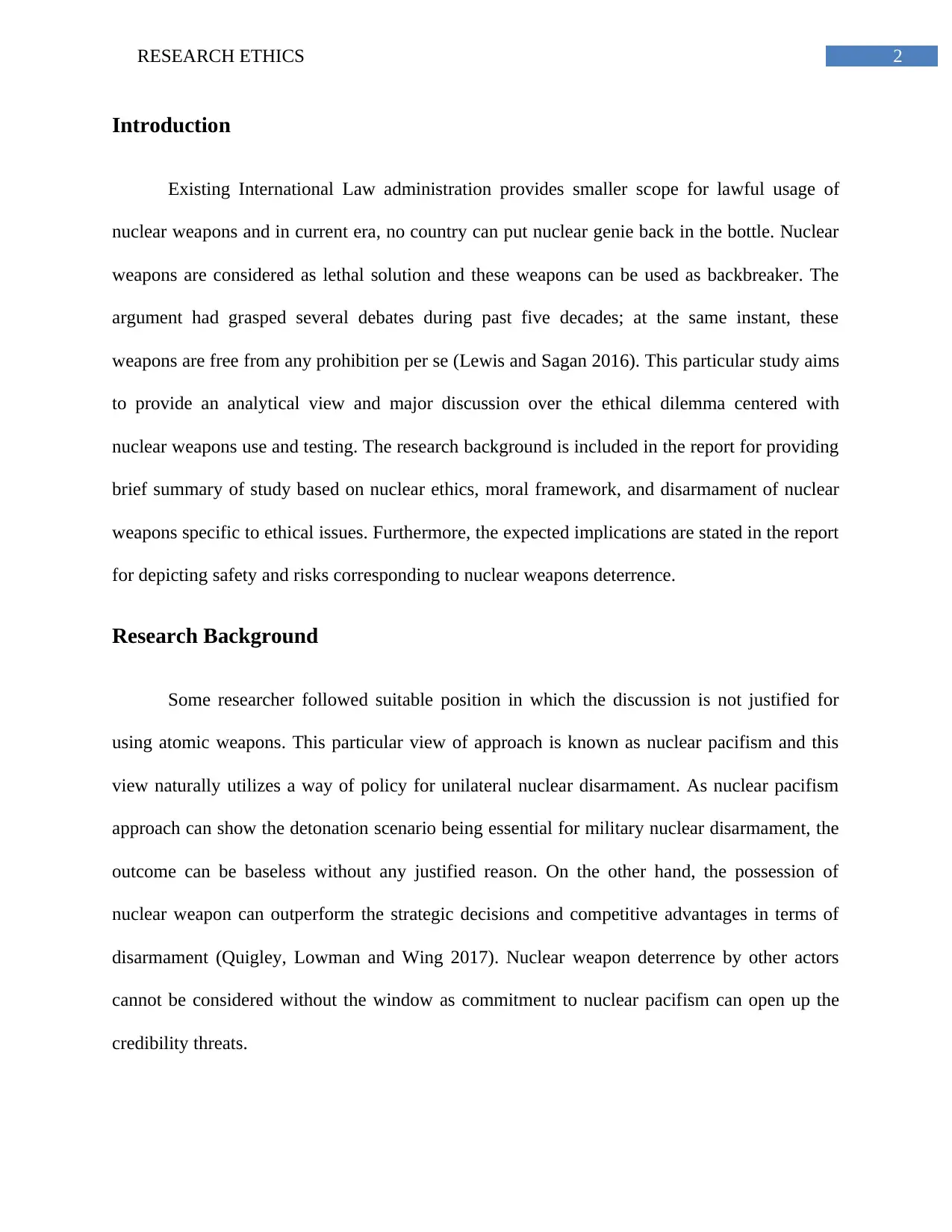
2RESEARCH ETHICS
Introduction
Existing International Law administration provides smaller scope for lawful usage of
nuclear weapons and in current era, no country can put nuclear genie back in the bottle. Nuclear
weapons are considered as lethal solution and these weapons can be used as backbreaker. The
argument had grasped several debates during past five decades; at the same instant, these
weapons are free from any prohibition per se (Lewis and Sagan 2016). This particular study aims
to provide an analytical view and major discussion over the ethical dilemma centered with
nuclear weapons use and testing. The research background is included in the report for providing
brief summary of study based on nuclear ethics, moral framework, and disarmament of nuclear
weapons specific to ethical issues. Furthermore, the expected implications are stated in the report
for depicting safety and risks corresponding to nuclear weapons deterrence.
Research Background
Some researcher followed suitable position in which the discussion is not justified for
using atomic weapons. This particular view of approach is known as nuclear pacifism and this
view naturally utilizes a way of policy for unilateral nuclear disarmament. As nuclear pacifism
approach can show the detonation scenario being essential for military nuclear disarmament, the
outcome can be baseless without any justified reason. On the other hand, the possession of
nuclear weapon can outperform the strategic decisions and competitive advantages in terms of
disarmament (Quigley, Lowman and Wing 2017). Nuclear weapon deterrence by other actors
cannot be considered without the window as commitment to nuclear pacifism can open up the
credibility threats.
Introduction
Existing International Law administration provides smaller scope for lawful usage of
nuclear weapons and in current era, no country can put nuclear genie back in the bottle. Nuclear
weapons are considered as lethal solution and these weapons can be used as backbreaker. The
argument had grasped several debates during past five decades; at the same instant, these
weapons are free from any prohibition per se (Lewis and Sagan 2016). This particular study aims
to provide an analytical view and major discussion over the ethical dilemma centered with
nuclear weapons use and testing. The research background is included in the report for providing
brief summary of study based on nuclear ethics, moral framework, and disarmament of nuclear
weapons specific to ethical issues. Furthermore, the expected implications are stated in the report
for depicting safety and risks corresponding to nuclear weapons deterrence.
Research Background
Some researcher followed suitable position in which the discussion is not justified for
using atomic weapons. This particular view of approach is known as nuclear pacifism and this
view naturally utilizes a way of policy for unilateral nuclear disarmament. As nuclear pacifism
approach can show the detonation scenario being essential for military nuclear disarmament, the
outcome can be baseless without any justified reason. On the other hand, the possession of
nuclear weapon can outperform the strategic decisions and competitive advantages in terms of
disarmament (Quigley, Lowman and Wing 2017). Nuclear weapon deterrence by other actors
cannot be considered without the window as commitment to nuclear pacifism can open up the
credibility threats.
⊘ This is a preview!⊘
Do you want full access?
Subscribe today to unlock all pages.

Trusted by 1+ million students worldwide
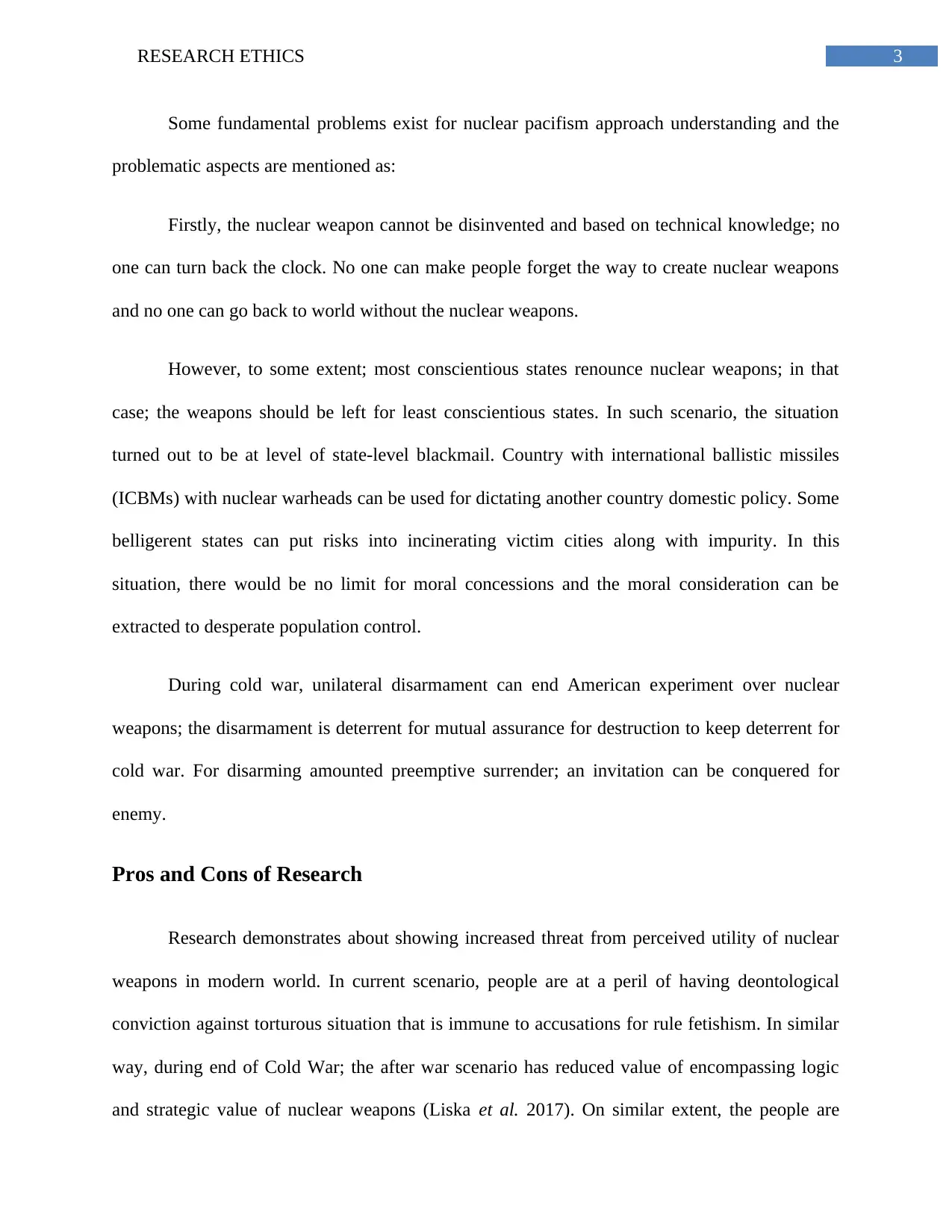
3RESEARCH ETHICS
Some fundamental problems exist for nuclear pacifism approach understanding and the
problematic aspects are mentioned as:
Firstly, the nuclear weapon cannot be disinvented and based on technical knowledge; no
one can turn back the clock. No one can make people forget the way to create nuclear weapons
and no one can go back to world without the nuclear weapons.
However, to some extent; most conscientious states renounce nuclear weapons; in that
case; the weapons should be left for least conscientious states. In such scenario, the situation
turned out to be at level of state-level blackmail. Country with international ballistic missiles
(ICBMs) with nuclear warheads can be used for dictating another country domestic policy. Some
belligerent states can put risks into incinerating victim cities along with impurity. In this
situation, there would be no limit for moral concessions and the moral consideration can be
extracted to desperate population control.
During cold war, unilateral disarmament can end American experiment over nuclear
weapons; the disarmament is deterrent for mutual assurance for destruction to keep deterrent for
cold war. For disarming amounted preemptive surrender; an invitation can be conquered for
enemy.
Pros and Cons of Research
Research demonstrates about showing increased threat from perceived utility of nuclear
weapons in modern world. In current scenario, people are at a peril of having deontological
conviction against torturous situation that is immune to accusations for rule fetishism. In similar
way, during end of Cold War; the after war scenario has reduced value of encompassing logic
and strategic value of nuclear weapons (Liska et al. 2017). On similar extent, the people are
Some fundamental problems exist for nuclear pacifism approach understanding and the
problematic aspects are mentioned as:
Firstly, the nuclear weapon cannot be disinvented and based on technical knowledge; no
one can turn back the clock. No one can make people forget the way to create nuclear weapons
and no one can go back to world without the nuclear weapons.
However, to some extent; most conscientious states renounce nuclear weapons; in that
case; the weapons should be left for least conscientious states. In such scenario, the situation
turned out to be at level of state-level blackmail. Country with international ballistic missiles
(ICBMs) with nuclear warheads can be used for dictating another country domestic policy. Some
belligerent states can put risks into incinerating victim cities along with impurity. In this
situation, there would be no limit for moral concessions and the moral consideration can be
extracted to desperate population control.
During cold war, unilateral disarmament can end American experiment over nuclear
weapons; the disarmament is deterrent for mutual assurance for destruction to keep deterrent for
cold war. For disarming amounted preemptive surrender; an invitation can be conquered for
enemy.
Pros and Cons of Research
Research demonstrates about showing increased threat from perceived utility of nuclear
weapons in modern world. In current scenario, people are at a peril of having deontological
conviction against torturous situation that is immune to accusations for rule fetishism. In similar
way, during end of Cold War; the after war scenario has reduced value of encompassing logic
and strategic value of nuclear weapons (Liska et al. 2017). On similar extent, the people are
Paraphrase This Document
Need a fresh take? Get an instant paraphrase of this document with our AI Paraphraser
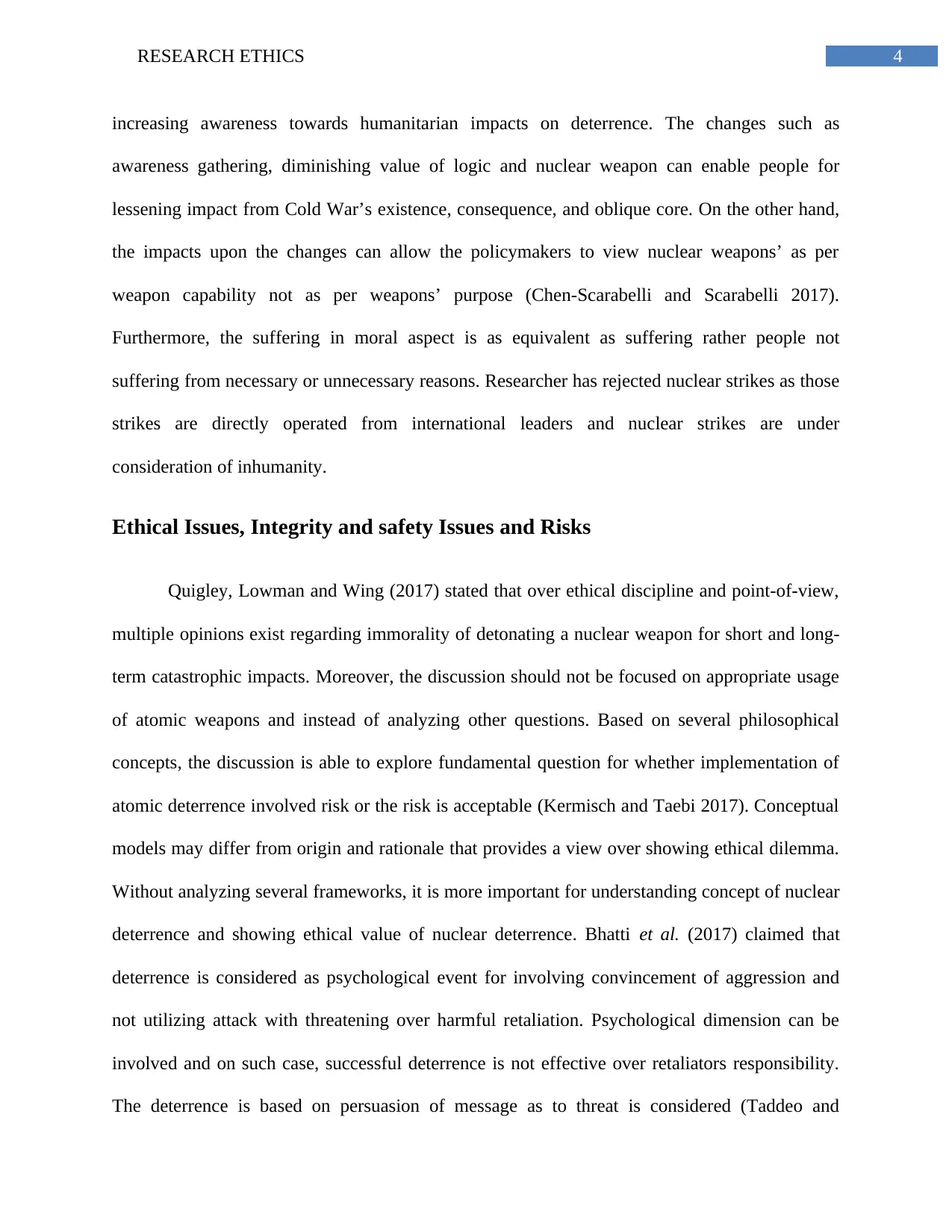
4RESEARCH ETHICS
increasing awareness towards humanitarian impacts on deterrence. The changes such as
awareness gathering, diminishing value of logic and nuclear weapon can enable people for
lessening impact from Cold War’s existence, consequence, and oblique core. On the other hand,
the impacts upon the changes can allow the policymakers to view nuclear weapons’ as per
weapon capability not as per weapons’ purpose (Chen-Scarabelli and Scarabelli 2017).
Furthermore, the suffering in moral aspect is as equivalent as suffering rather people not
suffering from necessary or unnecessary reasons. Researcher has rejected nuclear strikes as those
strikes are directly operated from international leaders and nuclear strikes are under
consideration of inhumanity.
Ethical Issues, Integrity and safety Issues and Risks
Quigley, Lowman and Wing (2017) stated that over ethical discipline and point-of-view,
multiple opinions exist regarding immorality of detonating a nuclear weapon for short and long-
term catastrophic impacts. Moreover, the discussion should not be focused on appropriate usage
of atomic weapons and instead of analyzing other questions. Based on several philosophical
concepts, the discussion is able to explore fundamental question for whether implementation of
atomic deterrence involved risk or the risk is acceptable (Kermisch and Taebi 2017). Conceptual
models may differ from origin and rationale that provides a view over showing ethical dilemma.
Without analyzing several frameworks, it is more important for understanding concept of nuclear
deterrence and showing ethical value of nuclear deterrence. Bhatti et al. (2017) claimed that
deterrence is considered as psychological event for involving convincement of aggression and
not utilizing attack with threatening over harmful retaliation. Psychological dimension can be
involved and on such case, successful deterrence is not effective over retaliators responsibility.
The deterrence is based on persuasion of message as to threat is considered (Taddeo and
increasing awareness towards humanitarian impacts on deterrence. The changes such as
awareness gathering, diminishing value of logic and nuclear weapon can enable people for
lessening impact from Cold War’s existence, consequence, and oblique core. On the other hand,
the impacts upon the changes can allow the policymakers to view nuclear weapons’ as per
weapon capability not as per weapons’ purpose (Chen-Scarabelli and Scarabelli 2017).
Furthermore, the suffering in moral aspect is as equivalent as suffering rather people not
suffering from necessary or unnecessary reasons. Researcher has rejected nuclear strikes as those
strikes are directly operated from international leaders and nuclear strikes are under
consideration of inhumanity.
Ethical Issues, Integrity and safety Issues and Risks
Quigley, Lowman and Wing (2017) stated that over ethical discipline and point-of-view,
multiple opinions exist regarding immorality of detonating a nuclear weapon for short and long-
term catastrophic impacts. Moreover, the discussion should not be focused on appropriate usage
of atomic weapons and instead of analyzing other questions. Based on several philosophical
concepts, the discussion is able to explore fundamental question for whether implementation of
atomic deterrence involved risk or the risk is acceptable (Kermisch and Taebi 2017). Conceptual
models may differ from origin and rationale that provides a view over showing ethical dilemma.
Without analyzing several frameworks, it is more important for understanding concept of nuclear
deterrence and showing ethical value of nuclear deterrence. Bhatti et al. (2017) claimed that
deterrence is considered as psychological event for involving convincement of aggression and
not utilizing attack with threatening over harmful retaliation. Psychological dimension can be
involved and on such case, successful deterrence is not effective over retaliators responsibility.
The deterrence is based on persuasion of message as to threat is considered (Taddeo and
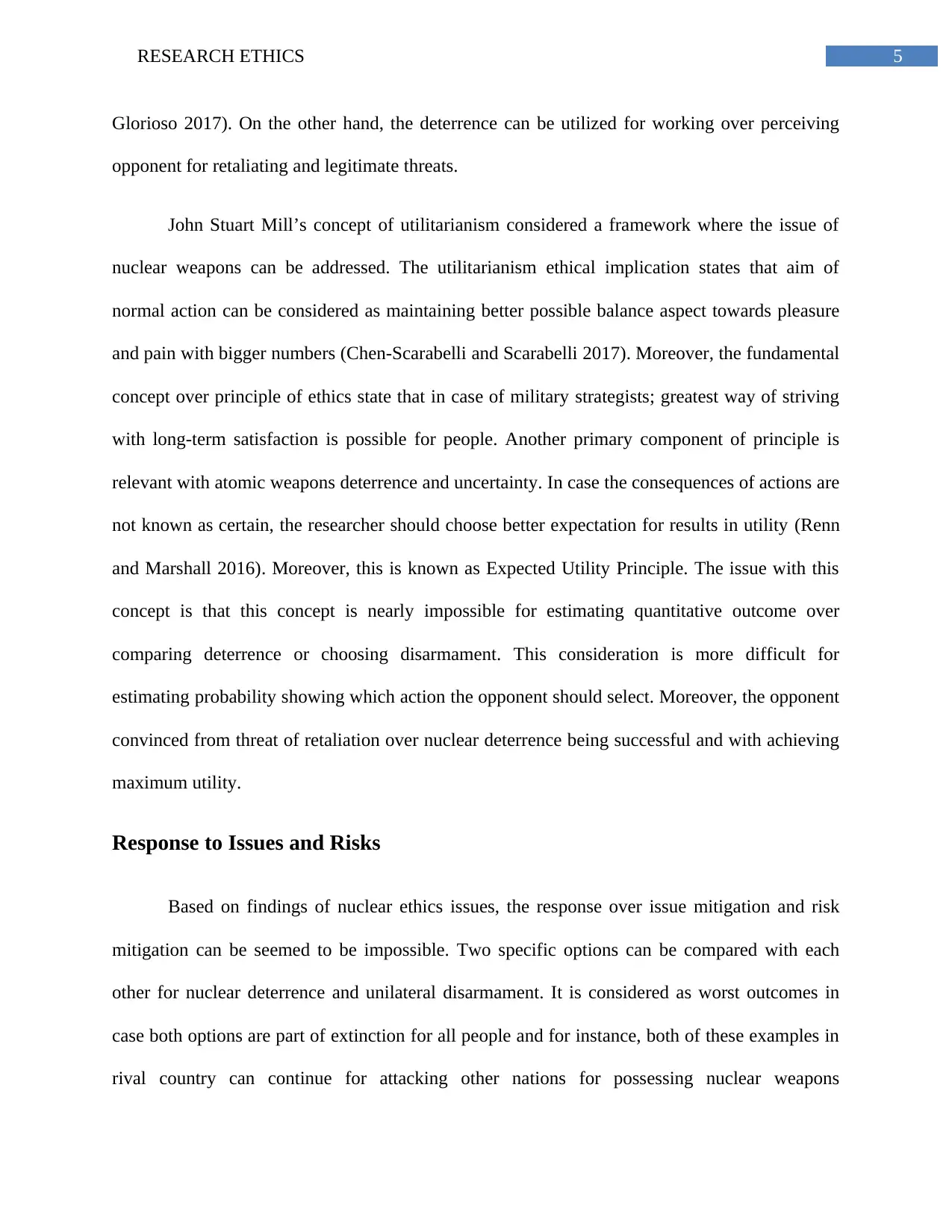
5RESEARCH ETHICS
Glorioso 2017). On the other hand, the deterrence can be utilized for working over perceiving
opponent for retaliating and legitimate threats.
John Stuart Mill’s concept of utilitarianism considered a framework where the issue of
nuclear weapons can be addressed. The utilitarianism ethical implication states that aim of
normal action can be considered as maintaining better possible balance aspect towards pleasure
and pain with bigger numbers (Chen-Scarabelli and Scarabelli 2017). Moreover, the fundamental
concept over principle of ethics state that in case of military strategists; greatest way of striving
with long-term satisfaction is possible for people. Another primary component of principle is
relevant with atomic weapons deterrence and uncertainty. In case the consequences of actions are
not known as certain, the researcher should choose better expectation for results in utility (Renn
and Marshall 2016). Moreover, this is known as Expected Utility Principle. The issue with this
concept is that this concept is nearly impossible for estimating quantitative outcome over
comparing deterrence or choosing disarmament. This consideration is more difficult for
estimating probability showing which action the opponent should select. Moreover, the opponent
convinced from threat of retaliation over nuclear deterrence being successful and with achieving
maximum utility.
Response to Issues and Risks
Based on findings of nuclear ethics issues, the response over issue mitigation and risk
mitigation can be seemed to be impossible. Two specific options can be compared with each
other for nuclear deterrence and unilateral disarmament. It is considered as worst outcomes in
case both options are part of extinction for all people and for instance, both of these examples in
rival country can continue for attacking other nations for possessing nuclear weapons
Glorioso 2017). On the other hand, the deterrence can be utilized for working over perceiving
opponent for retaliating and legitimate threats.
John Stuart Mill’s concept of utilitarianism considered a framework where the issue of
nuclear weapons can be addressed. The utilitarianism ethical implication states that aim of
normal action can be considered as maintaining better possible balance aspect towards pleasure
and pain with bigger numbers (Chen-Scarabelli and Scarabelli 2017). Moreover, the fundamental
concept over principle of ethics state that in case of military strategists; greatest way of striving
with long-term satisfaction is possible for people. Another primary component of principle is
relevant with atomic weapons deterrence and uncertainty. In case the consequences of actions are
not known as certain, the researcher should choose better expectation for results in utility (Renn
and Marshall 2016). Moreover, this is known as Expected Utility Principle. The issue with this
concept is that this concept is nearly impossible for estimating quantitative outcome over
comparing deterrence or choosing disarmament. This consideration is more difficult for
estimating probability showing which action the opponent should select. Moreover, the opponent
convinced from threat of retaliation over nuclear deterrence being successful and with achieving
maximum utility.
Response to Issues and Risks
Based on findings of nuclear ethics issues, the response over issue mitigation and risk
mitigation can be seemed to be impossible. Two specific options can be compared with each
other for nuclear deterrence and unilateral disarmament. It is considered as worst outcomes in
case both options are part of extinction for all people and for instance, both of these examples in
rival country can continue for attacking other nations for possessing nuclear weapons
⊘ This is a preview!⊘
Do you want full access?
Subscribe today to unlock all pages.

Trusted by 1+ million students worldwide
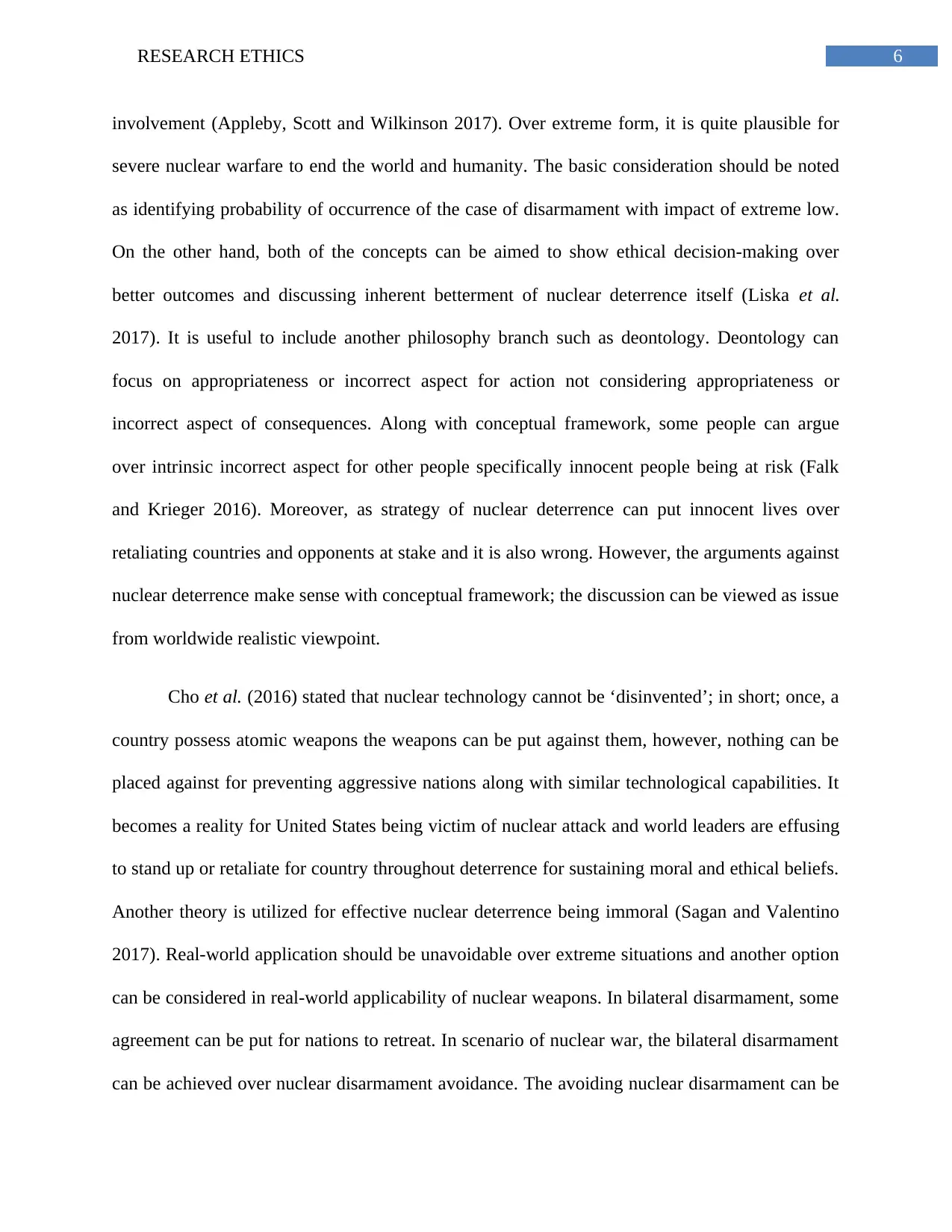
6RESEARCH ETHICS
involvement (Appleby, Scott and Wilkinson 2017). Over extreme form, it is quite plausible for
severe nuclear warfare to end the world and humanity. The basic consideration should be noted
as identifying probability of occurrence of the case of disarmament with impact of extreme low.
On the other hand, both of the concepts can be aimed to show ethical decision-making over
better outcomes and discussing inherent betterment of nuclear deterrence itself (Liska et al.
2017). It is useful to include another philosophy branch such as deontology. Deontology can
focus on appropriateness or incorrect aspect for action not considering appropriateness or
incorrect aspect of consequences. Along with conceptual framework, some people can argue
over intrinsic incorrect aspect for other people specifically innocent people being at risk (Falk
and Krieger 2016). Moreover, as strategy of nuclear deterrence can put innocent lives over
retaliating countries and opponents at stake and it is also wrong. However, the arguments against
nuclear deterrence make sense with conceptual framework; the discussion can be viewed as issue
from worldwide realistic viewpoint.
Cho et al. (2016) stated that nuclear technology cannot be ‘disinvented’; in short; once, a
country possess atomic weapons the weapons can be put against them, however, nothing can be
placed against for preventing aggressive nations along with similar technological capabilities. It
becomes a reality for United States being victim of nuclear attack and world leaders are effusing
to stand up or retaliate for country throughout deterrence for sustaining moral and ethical beliefs.
Another theory is utilized for effective nuclear deterrence being immoral (Sagan and Valentino
2017). Real-world application should be unavoidable over extreme situations and another option
can be considered in real-world applicability of nuclear weapons. In bilateral disarmament, some
agreement can be put for nations to retreat. In scenario of nuclear war, the bilateral disarmament
can be achieved over nuclear disarmament avoidance. The avoiding nuclear disarmament can be
involvement (Appleby, Scott and Wilkinson 2017). Over extreme form, it is quite plausible for
severe nuclear warfare to end the world and humanity. The basic consideration should be noted
as identifying probability of occurrence of the case of disarmament with impact of extreme low.
On the other hand, both of the concepts can be aimed to show ethical decision-making over
better outcomes and discussing inherent betterment of nuclear deterrence itself (Liska et al.
2017). It is useful to include another philosophy branch such as deontology. Deontology can
focus on appropriateness or incorrect aspect for action not considering appropriateness or
incorrect aspect of consequences. Along with conceptual framework, some people can argue
over intrinsic incorrect aspect for other people specifically innocent people being at risk (Falk
and Krieger 2016). Moreover, as strategy of nuclear deterrence can put innocent lives over
retaliating countries and opponents at stake and it is also wrong. However, the arguments against
nuclear deterrence make sense with conceptual framework; the discussion can be viewed as issue
from worldwide realistic viewpoint.
Cho et al. (2016) stated that nuclear technology cannot be ‘disinvented’; in short; once, a
country possess atomic weapons the weapons can be put against them, however, nothing can be
placed against for preventing aggressive nations along with similar technological capabilities. It
becomes a reality for United States being victim of nuclear attack and world leaders are effusing
to stand up or retaliate for country throughout deterrence for sustaining moral and ethical beliefs.
Another theory is utilized for effective nuclear deterrence being immoral (Sagan and Valentino
2017). Real-world application should be unavoidable over extreme situations and another option
can be considered in real-world applicability of nuclear weapons. In bilateral disarmament, some
agreement can be put for nations to retreat. In scenario of nuclear war, the bilateral disarmament
can be achieved over nuclear disarmament avoidance. The avoiding nuclear disarmament can be
Paraphrase This Document
Need a fresh take? Get an instant paraphrase of this document with our AI Paraphraser
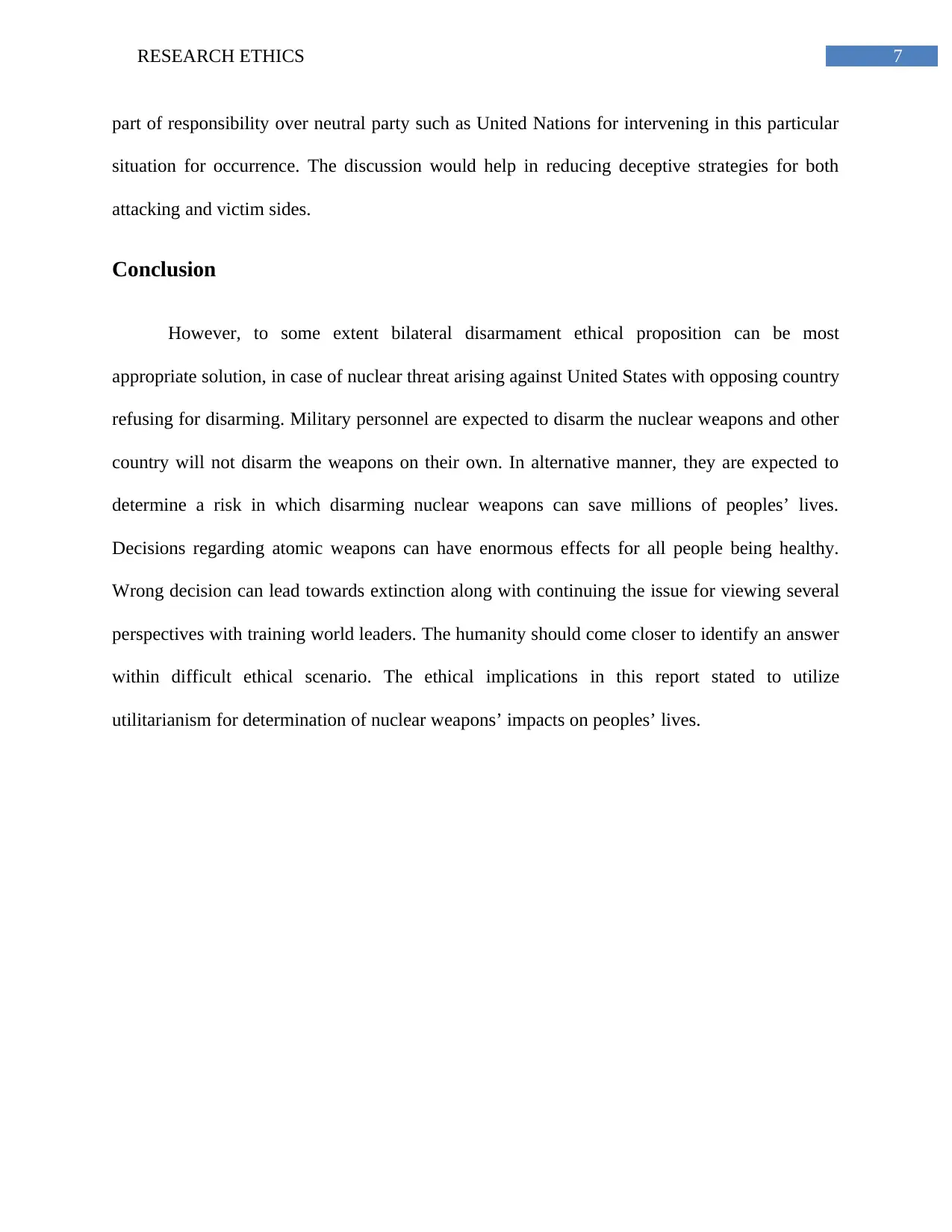
7RESEARCH ETHICS
part of responsibility over neutral party such as United Nations for intervening in this particular
situation for occurrence. The discussion would help in reducing deceptive strategies for both
attacking and victim sides.
Conclusion
However, to some extent bilateral disarmament ethical proposition can be most
appropriate solution, in case of nuclear threat arising against United States with opposing country
refusing for disarming. Military personnel are expected to disarm the nuclear weapons and other
country will not disarm the weapons on their own. In alternative manner, they are expected to
determine a risk in which disarming nuclear weapons can save millions of peoples’ lives.
Decisions regarding atomic weapons can have enormous effects for all people being healthy.
Wrong decision can lead towards extinction along with continuing the issue for viewing several
perspectives with training world leaders. The humanity should come closer to identify an answer
within difficult ethical scenario. The ethical implications in this report stated to utilize
utilitarianism for determination of nuclear weapons’ impacts on peoples’ lives.
part of responsibility over neutral party such as United Nations for intervening in this particular
situation for occurrence. The discussion would help in reducing deceptive strategies for both
attacking and victim sides.
Conclusion
However, to some extent bilateral disarmament ethical proposition can be most
appropriate solution, in case of nuclear threat arising against United States with opposing country
refusing for disarming. Military personnel are expected to disarm the nuclear weapons and other
country will not disarm the weapons on their own. In alternative manner, they are expected to
determine a risk in which disarming nuclear weapons can save millions of peoples’ lives.
Decisions regarding atomic weapons can have enormous effects for all people being healthy.
Wrong decision can lead towards extinction along with continuing the issue for viewing several
perspectives with training world leaders. The humanity should come closer to identify an answer
within difficult ethical scenario. The ethical implications in this report stated to utilize
utilitarianism for determination of nuclear weapons’ impacts on peoples’ lives.
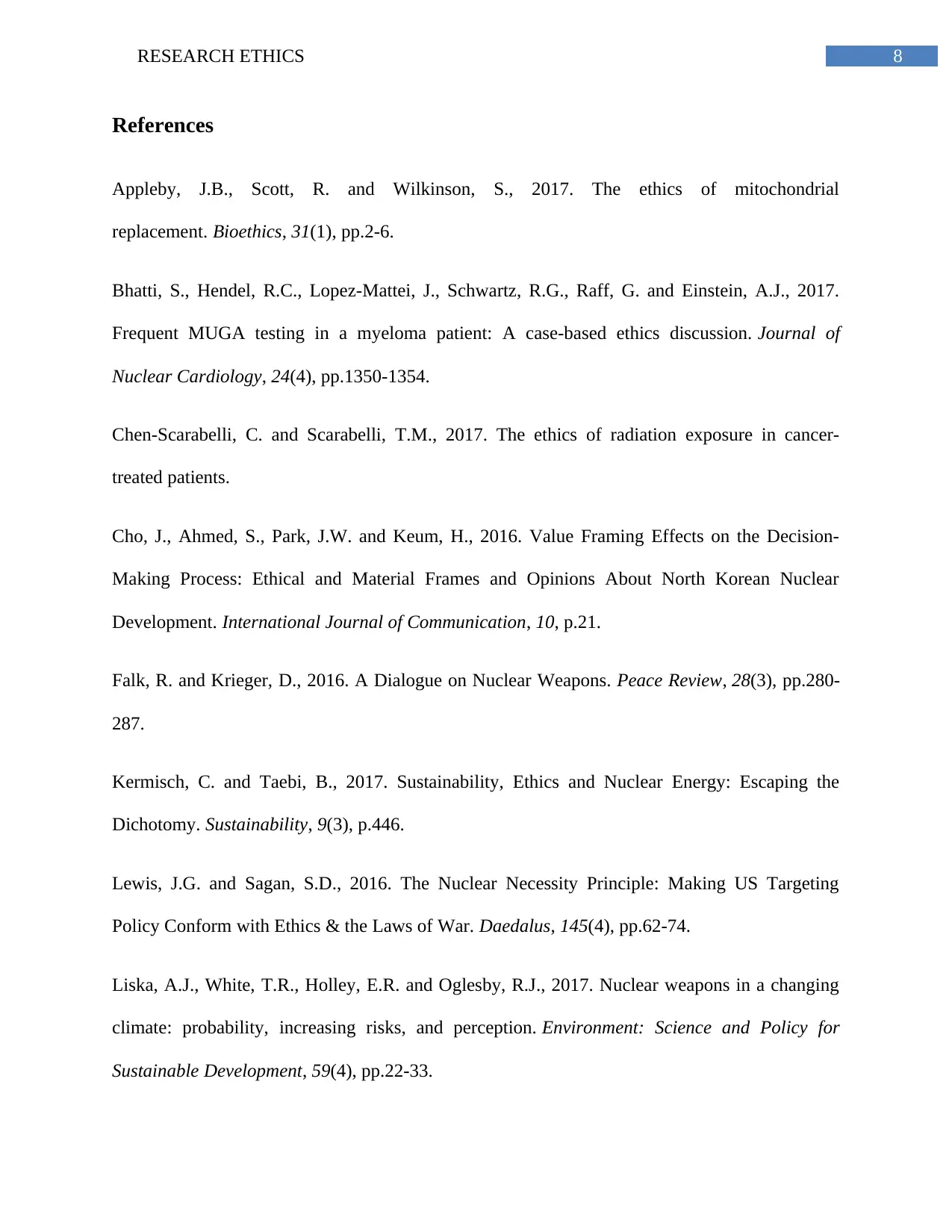
8RESEARCH ETHICS
References
Appleby, J.B., Scott, R. and Wilkinson, S., 2017. The ethics of mitochondrial
replacement. Bioethics, 31(1), pp.2-6.
Bhatti, S., Hendel, R.C., Lopez-Mattei, J., Schwartz, R.G., Raff, G. and Einstein, A.J., 2017.
Frequent MUGA testing in a myeloma patient: A case-based ethics discussion. Journal of
Nuclear Cardiology, 24(4), pp.1350-1354.
Chen-Scarabelli, C. and Scarabelli, T.M., 2017. The ethics of radiation exposure in cancer-
treated patients.
Cho, J., Ahmed, S., Park, J.W. and Keum, H., 2016. Value Framing Effects on the Decision-
Making Process: Ethical and Material Frames and Opinions About North Korean Nuclear
Development. International Journal of Communication, 10, p.21.
Falk, R. and Krieger, D., 2016. A Dialogue on Nuclear Weapons. Peace Review, 28(3), pp.280-
287.
Kermisch, C. and Taebi, B., 2017. Sustainability, Ethics and Nuclear Energy: Escaping the
Dichotomy. Sustainability, 9(3), p.446.
Lewis, J.G. and Sagan, S.D., 2016. The Nuclear Necessity Principle: Making US Targeting
Policy Conform with Ethics & the Laws of War. Daedalus, 145(4), pp.62-74.
Liska, A.J., White, T.R., Holley, E.R. and Oglesby, R.J., 2017. Nuclear weapons in a changing
climate: probability, increasing risks, and perception. Environment: Science and Policy for
Sustainable Development, 59(4), pp.22-33.
References
Appleby, J.B., Scott, R. and Wilkinson, S., 2017. The ethics of mitochondrial
replacement. Bioethics, 31(1), pp.2-6.
Bhatti, S., Hendel, R.C., Lopez-Mattei, J., Schwartz, R.G., Raff, G. and Einstein, A.J., 2017.
Frequent MUGA testing in a myeloma patient: A case-based ethics discussion. Journal of
Nuclear Cardiology, 24(4), pp.1350-1354.
Chen-Scarabelli, C. and Scarabelli, T.M., 2017. The ethics of radiation exposure in cancer-
treated patients.
Cho, J., Ahmed, S., Park, J.W. and Keum, H., 2016. Value Framing Effects on the Decision-
Making Process: Ethical and Material Frames and Opinions About North Korean Nuclear
Development. International Journal of Communication, 10, p.21.
Falk, R. and Krieger, D., 2016. A Dialogue on Nuclear Weapons. Peace Review, 28(3), pp.280-
287.
Kermisch, C. and Taebi, B., 2017. Sustainability, Ethics and Nuclear Energy: Escaping the
Dichotomy. Sustainability, 9(3), p.446.
Lewis, J.G. and Sagan, S.D., 2016. The Nuclear Necessity Principle: Making US Targeting
Policy Conform with Ethics & the Laws of War. Daedalus, 145(4), pp.62-74.
Liska, A.J., White, T.R., Holley, E.R. and Oglesby, R.J., 2017. Nuclear weapons in a changing
climate: probability, increasing risks, and perception. Environment: Science and Policy for
Sustainable Development, 59(4), pp.22-33.
⊘ This is a preview!⊘
Do you want full access?
Subscribe today to unlock all pages.

Trusted by 1+ million students worldwide
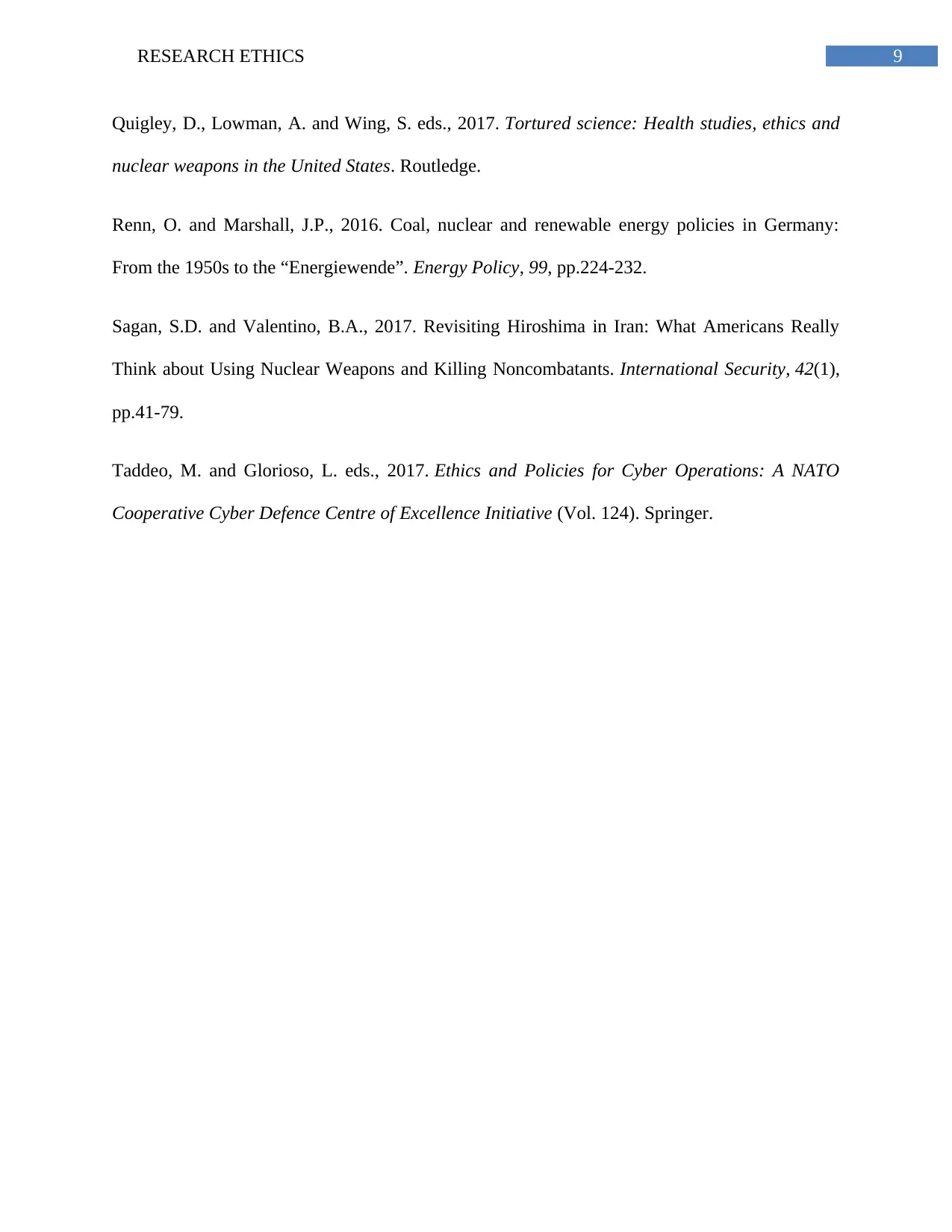
9RESEARCH ETHICS
Quigley, D., Lowman, A. and Wing, S. eds., 2017. Tortured science: Health studies, ethics and
nuclear weapons in the United States. Routledge.
Renn, O. and Marshall, J.P., 2016. Coal, nuclear and renewable energy policies in Germany:
From the 1950s to the “Energiewende”. Energy Policy, 99, pp.224-232.
Sagan, S.D. and Valentino, B.A., 2017. Revisiting Hiroshima in Iran: What Americans Really
Think about Using Nuclear Weapons and Killing Noncombatants. International Security, 42(1),
pp.41-79.
Taddeo, M. and Glorioso, L. eds., 2017. Ethics and Policies for Cyber Operations: A NATO
Cooperative Cyber Defence Centre of Excellence Initiative (Vol. 124). Springer.
Quigley, D., Lowman, A. and Wing, S. eds., 2017. Tortured science: Health studies, ethics and
nuclear weapons in the United States. Routledge.
Renn, O. and Marshall, J.P., 2016. Coal, nuclear and renewable energy policies in Germany:
From the 1950s to the “Energiewende”. Energy Policy, 99, pp.224-232.
Sagan, S.D. and Valentino, B.A., 2017. Revisiting Hiroshima in Iran: What Americans Really
Think about Using Nuclear Weapons and Killing Noncombatants. International Security, 42(1),
pp.41-79.
Taddeo, M. and Glorioso, L. eds., 2017. Ethics and Policies for Cyber Operations: A NATO
Cooperative Cyber Defence Centre of Excellence Initiative (Vol. 124). Springer.
1 out of 10
Related Documents
Your All-in-One AI-Powered Toolkit for Academic Success.
+13062052269
info@desklib.com
Available 24*7 on WhatsApp / Email
![[object Object]](/_next/static/media/star-bottom.7253800d.svg)
Unlock your academic potential
Copyright © 2020–2026 A2Z Services. All Rights Reserved. Developed and managed by ZUCOL.





